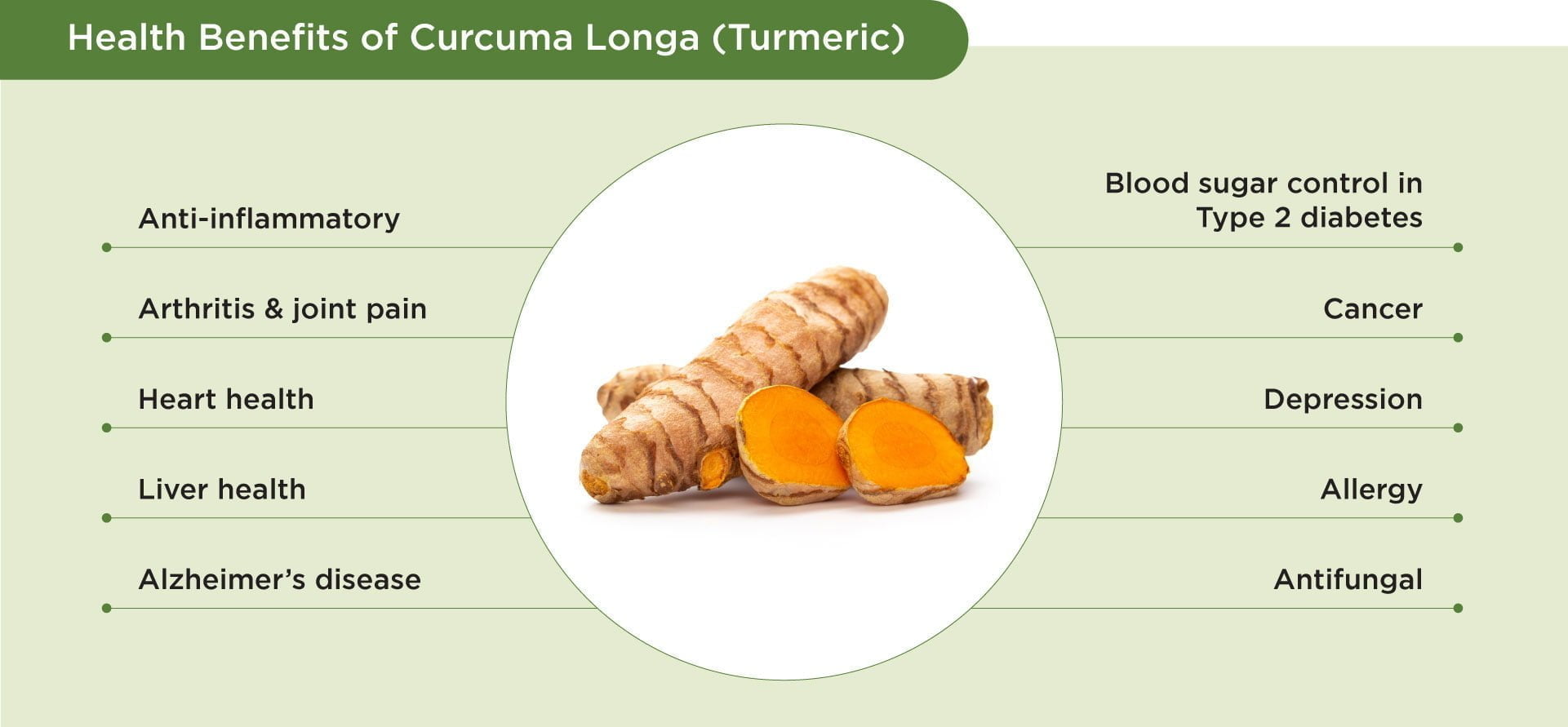Curcuma longa (Turmeric)

Curcuma longa (Turmeric)
Curcuma longa, also known as Turmeric, is a rhizomatous herbaceous perennial plant of the ginger family 1. The other name Curcuma longa is Curcuma domestica or Curcuma domestica Valenton. Turmeric is the spice that gives curry its yellow colour and has been used in India and other parts of Southeast Asia. Other than using Turmeric in the culinary world, it also has a long history of use in traditional Ayurvedic and Chinese Medicine for its health-promoting properties 1. Curcumin is the main active ingredient in Curcuma longa with medicinal properties. Curcumin is used for the treatment of various diseases, such as rheumatoid arthritis, urinary tract infections, fatty liver disease, Inflammatory bowel disease (IBD), Alzheimer’s disease etc 2.
Nutritional Facts
Turmeric contains more than 300 naturally occurring components including beta-carotene, vitamin C, vitamin B6, choline, niacin, riboflavin, iron, calcium, manganese, copper, potassium, zinc, magnesium, flavonoids, fiber, and other nutrients. The bioactive compound that is linked to its most highly touted health benefits is Curcumin. Many laboratory studies have suggested that curcumin has anti-inflammatory, antioxidant, antibacterial, antiviral, and anti-carcinogenic activity 2.
Published Health Benefits
1. Anti-inflammatory
Curcumin reduces inflammation through its inhibition of key inflammatory markers in the body. Curcumin is effective against acute inflammation such as sore throat, sinusitis, and gingivitis, and chronic inflammation such as rheumatoid arthritis, sciatica, hepatitis, diabetes, and Inflammatory Bowel Disease (IBD) 1,2.
2. Arthritis & Joint Pain
Curcuma longa is rich in anti-inflammatory and antioxidant compounds which can help to relieve inflammation that takes place in these joints. Studies have shown curcumin to have an anti-rheumatic effect comparable to some NSAIDs. The safety and effectiveness of curcumin make it an attractive option for treating some rheumatic diseases 3.
3. Heart Health
Curcumin has been shown to have some efficacy in treating hypercholesterolemia and hypertension. Curcumin has been shown to improve vascular endothelial function, a modulator of blood pressure that declines with age, as well as to regulate cholesterol by increasing HDL cholesterol, decrease total body cholesterol and triglycerides 1.
4. Liver Health
Curcuma longa stimulates bile production and releases from the gallbladder, helping eliminate unwanted waste from the body, correcting metabolic imbalances, thereby exerting potent liver protective effect 1,2.
5. Alzheimer’s Disease
Curcuminoids can help reduce beta-amyloid plaque build-up on the brain and reduce neuroinflammation, thus slowing the progression of early Alzheimer’s disease 1.
6. Blood Sugar Control in Type 2 Diabetes
Curcumin may help in preventing Type 2 diabetes through its anti-inflammatory and antioxidant properties. Curcumin interacts with pancreatic cells, white blood cells, beta cells, and down-regulates inflammatory cytokines, thereby reversing insulin resistance and hyperglycaemia 2,3.
7. Cancer
Cancer is characterized by uncontrolled cell growth. Curcumin has been found to affect cancer growth, development, and spread at the molecular level. Curcumin reduces angiogenesis (growth of new blood vessels in tumours) and metastasis (spread of cancer), thus inhibiting the growth of tumours. Studies suggest it has protective effects against pancreatic, colorectal, prostate, and breast cancer 1,3.
8. Depression
Depression is linked to reduced levels of brain-derived neurotrophic factor (BDNF). Curcumin appears to have an antidepressant effect through its ability to boost BDNF levels and modulate levels of serotonin and dopamine. Thus, it may be a good complementary treatment for depression 1.
9. Allergy
The anti-inflammatory activity of curcumin can reduce signs of allergic rhinitis such as sneezing, nasal congestion, and runny nose 4.
10. Antifungal
Current evidence suggests Curcuma longa contains antifungal properties which have been shown in its ability to reduce candida overgrowth 3.
References:
1. Labban, Louay. (2014). Medicinal and pharmacological properties of Turmeric (Curcuma longa): A review. Int J Pharm Biomed Sci. 5. 17-23.
2. Mishra, Sunidhi & Goel, Bharti. (2020). Pharmaceutical and Nutritional Properties of Turmeric (Curcuma longa): A Mini Review. Advances in Zoology and Botany. 8. 83-86. 10.13189/azb.2020.080302.
3. Rahul Kumar Verma, Preeti Kumari, Rohit Kumar Maurya, Vijay Kumar, RB Verma, and Rahul Kumar Singh. (2018) Medicinal properties of turmeric (Curcuma longa L.): A review. International Journal of Chemical Studies; 6(4): 1354-1357
4. Wu, S., & Xiao, D. (2016). Effect of curcumin on nasal symptoms and airflow in patients with perennial allergic rhinitis. Annals of allergy, asthma & immunology: official publication of the American College of Allergy, Asthma, & Immunology, 117(6), 697–702.e1. https://doi.org/10.1016/j.anai.2016.09.427









